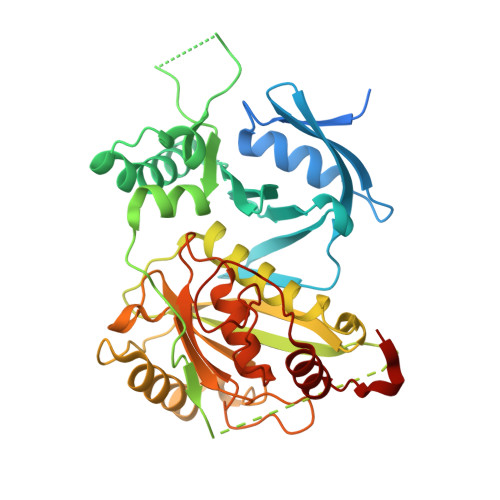Repositioning small molecule drugs as allosteric inhibitors of the BFT-3 toxin from enterotoxigenic Bacteroides fragilis.
Jimenez-Alesanco, A., Eckhard, U., Asencio Del Rio, M., Vega, S., Guevara, T., Velazquez-Campoy, A., Gomis-Ruth, F.X., Abian, O.(2022) Protein Sci 31: e4427-e4427
- PubMed: 36173175
- DOI: https://doi.org/10.1002/pro.4427
- Primary Citation of Related Structures:
7PND, 7POL, 7POO, 7POQ, 7POU - PubMed Abstract:
Bacteroides fragilis is an abundant commensal component of the healthy human colon. However, under dysbiotic conditions, enterotoxigenic B. fragilis (ETBF) may arise and elicit diarrhea, anaerobic bacteremia, inflammatory bowel disease, and colorectal cancer. Most worrisome, ETBF is resistant to many disparate antibiotics. ETBF's only recognized specific virulence factor is a zinc-dependent metallopeptidase (MP) called B. fragilis toxin (BFT) or fragilysin, which damages the intestinal mucosa and triggers disease-related signaling mechanisms. Thus, therapeutic targeting of BFT is expected to limit ETBF pathogenicity and improve the prognosis for patients. We focused on one of the naturally occurring BFT isoforms, BFT-3, and managed to repurpose several approved drugs as BFT-3 inhibitors through a combination of biophysical, biochemical, structural, and cellular techniques. In contrast to canonical MP inhibitors, which target the active site of mature enzymes, these effectors bind to a distal allosteric site in the proBFT-3 zymogen structure, which stabilizes a partially unstructured, zinc-free enzyme conformation by shifting a zinc-dependent disorder-to-order equilibrium. This yields proBTF-3 incompetent for autoactivation, thus ablating hydrolytic activity of the mature toxin. Additionally, a similar destabilizing effect is observed for the activated protease according to biophysical and biochemical data. Our strategy paves a novel way for the development of highly specific inhibitors of ETBF-mediated enteropathogenic conditions.
Organizational Affiliation:
Institute for Biocomputation and Physics of Complex Systems (BIFI), Joint Unit GBsC-CSIC-BIFI, Universidad de Zaragoza, Zaragoza, Spain.


















